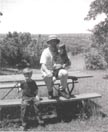Spring 2000, Volume 17.3
Poetry

Kael Moffat
Kael Moffat received his BA from Brigham Young University, and is now completing course work for his Masters at Oklahoma State University. He lives in Stillwater, Oklahoma, with his wife and two children, were he enjoys fishing for bass.
The Sun and the Hunt
to Kent Ripplinger
Chipped into the read stone outcrop
that rises like a great head
from the dry sage and scrub oak,
I find a man and a coyote and a spiral
symbol of the sun and eternity.
I climb the rock
to the man and the coyote
and the sun.
A ranger would say this petroglyph
marks a warrior's hunting ground,
a warning to others
with bows and arrows.
An anthropologist would read
the marks and tell me
about the warrior, his home,
and his family: his wife,
round and sweaty,
waiting for their child
to burst from her
like the sun from the hills,
his gray mother sitting
in the sparse shade of a joshua tree,
watching grains of sand roll
in the wind.
With my finger I trace
the jagged back
of the coyote, the imperfect
roundness of the man's head,
the spiral rising and believe
the warrior is apologizing to the Earth
and thanking her
for the sky and the stones
and the breath of the coyote.
Bone-Psalm for the Anasazi
Zions Canyon, Utah 1994
Three hundred feet of brown and red
Striations rise from the chattering stream.
Mexican padres, Mormon explorers,
And godless cowboys swore they saw
Your spirits shifting among the boulders,
The caves, and the tough cottonwoods
Not uprooted by floods. I hear
Your whispers in the narrows—
Why have you left us?
Come. Walk in the valley's shadow.
I dip my hand in the copper mud
That lines the stream and press it
Against the wall, trying to touch
Whoever will touch me.
Chrysler
It sinks into the red soil
along the road to Bryce Canyon.
A melancholy mammoth: headlights
smashed like spectacles,
the hood a cracked skull,
a hot plate for sluggish lizards
trying to bake off the morning.
No tires, dashboard, or steering wheel.
No scraps of paper
on the running board, no broken glass
by the petals, not even a faded Bible
under the bench with a cross
scratched into the brittle leather.
Let's say the owner was a blond man
from Dearborn, with two blond boys
and a red-haired wife who sang opera.
A vacuum cleaner salesman—no, a Teamster.
Believed in the stars, in fate, in God, whatever.
His mother knelt him beside the bed
and said, "Pray." He closed his eyes
and held his breath
like a diver going into black water.
"God, if you can hear me,
bless the Tigers, not the Yankees
or the Red Sox." He dreamt of Africa,
of elephants, cobras, zebras,
and smiling natives with beads of yellow
painted on their foreheads and breasts.
He came to Utah
to teach workers about their rights,
that they were neglected
by their employers, that a new day
really meant a new world.
"Make `em pay ya
what you're worth!" was his weekday
sermon. His best audiences
worked in the bauxite and silver mines
in the Uintas. On good days
he could almost make them
bury their hammers and spades
in their boss's skulls, burn
the company towns, and blast
the railroads. Other days
he went back to his hotel room
and rested his hand
on the serpentine handle
of the porcelain pitcher
as if it were the breast of a woman,
the breast of his wife.
He filled
his cupped hands with water,
washed the dust and sweat
from his cheeks and brow,
then stayed in the saloon
until three in the morning
with coal-faced Greeks,
Irishmen, and the Queen of Hearts.
Weeks alone, railroad trips, his wife
In Fillmore with their boys.
In Salt Lake, he beat a store owner
because he didn't have whisky to sell.
Did he drive this car
into the field to shoot rabbits?
Did he see God on the road
dressed in silver and flame?
Or was it the wheat that beckoned him
out to this tabernacle of dust
and stars and stones?
Annihilating History
The Vietnam War did not end when North Vietnamese tanks crashed through the gates of Saigon's National Palace. The war was an earnest cannibal, and even when it bled into the ocean in April of 1975, it continued to feed upon its children and glut the beaches of east Malaysia with lengths of ship wood and plastic wristbands and clots of black hair stuck in shells. One hundred thousand people, maybe two hundred thousand, vanished into the sea. Entire shiploads of people, simply gone, without witness, without mourning.
When history is annihilated there can be no closure, only a space, a hole, an intimation. — Paul Eggers, "The End of the Boat People," Colorado Review, Fall/Winter 1999, p. 146.
